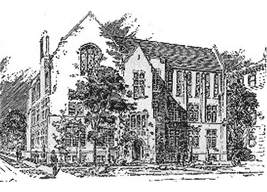People Who Have Shaped the Teaching Careers of Our Faculty—Part 3: Lessons Learned from Professor Jim Colliton
The editors of the blog asked several law school faculty to write about the people who have been the most formative figures in their careers as legal educators. This submission, the third in the series, is by Professor Vada Waters Lindsey.
When I enrolled in law school, my goal was to become a lobbyist. I majored in Political Science as an undergraduate student, worked for a state senator as a legislative aide and believed that a law degree would help me reach my professional goals. Upon enrolling in law school, my interests immediately shifted. I loved the law school environment. Before the end of my first year, I decided that my future was in the legal academy. Upon reaching the epiphany that altered the course of my professional career, I began to study my professors’ teaching styles so that I could emulate them when I entered the academy.
Several of my law school professors have been formative figures in my career as a legal educator. I learned the importance of consistency from Professor Jeffrey Shaman. I found Professor Wayne Lewis to be the most proficient professor in using the Socratic Method. Professor Jerold Friedland became a lifelong friend and mentor. But, the professor who had the most profound impact on my career as a legal educator was the late Professor James “Jim” Colliton. I followed his footsteps by working at the Chief Counsel’s Office of the Internal Revenue Service upon graduating from law school, earning my LL.M. in Taxation from Georgetown and becoming a tax professor. I took only one class with Professor Colliton – Estate and Gift Taxation. However, Professor Colliton’s impact on my professional life had little to do with the estate and gift tax principles such as the unified credit, marital deduction and Crummey trusts. Undoubtedly, Professor Colliton did an amazing job teaching those principles. What distinguished Professor Colliton from many other professors was his innate ability to connect with students both inside and outside of the classroom. Simply stated, Professor Colliton was one of the most supportive, helpful and caring faculty members that I have ever met. I graduated from law school over 20 years ago, but he remained a mentor and became one of my closest friends until he lost his courageous battle with cancer a few years ago.
As professors, our primary responsibility is to train future lawyers. I learned from Professor Colliton that that responsibility extended beyond the classroom. Excellent instruction is an absolute necessity. Professor Colliton was an outstanding in-class instructor, but he was also a tremendous mentor to students, including mentoring students who had never enrolled in any of his classes. I spent many hours in Professor Colliton’s office discussing careers in tax law. Therefore, I learned that law professors must not neglect the mentoring responsibility to law students. While the demands of scholarship, committee work, class preparation and other responsibilities are daunting at times, students should feel comfortable stopping by a professor’s office not only to discuss coursework but also to seek career advice, particularly during these weak economic times. Finally, I learned from Professor Colliton that the responsibility to our students continues after they graduate. When I decided it was time for me to enter the academy six years after graduating from law school, I sought Professor Colliton’s advice. He encouraged me to pursue my goals and was instrumental in helping me secure a position by guiding me through the whole process.
I have been in academia now for many years, and I know that the lessons I learned from Professor Colliton will last a lifetime.


